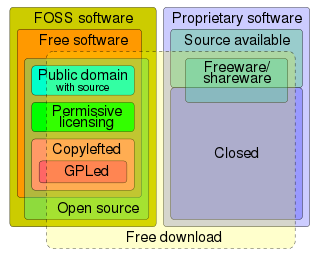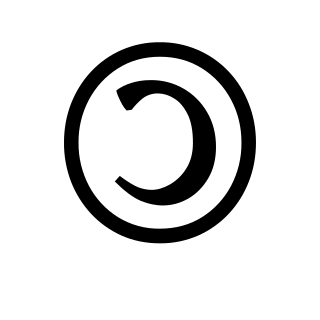Related Research Articles

Free software, libre software, or libreware is computer software distributed under terms that allow users to run the software for any purpose as well as to study, change, and distribute it and any adapted versions. Free software is a matter of liberty, not price; all users are legally free to do what they want with their copies of a free software regardless of how much is paid to obtain the program. Computer programs are deemed "free" if they give end-users ultimate control over the software and, subsequently, over their devices.

GNU is an extensive collection of free software, which can be used as an operating system or can be used in parts with other operating systems. The use of the completed GNU tools led to the family of operating systems popularly known as Linux. Most of GNU is licensed under the GNU Project's own General Public License (GPL).

Open-source licenses are software licenses that allow content to be used, modified, and shared. They facilitate free and open-source software (FOSS) development. Intellectual property (IP) laws restrict the modification and sharing of creative works. Free and open-source licenses use these existing legal structures for an inverse purpose. They grant the recipient the rights to use the software, examine the source code, modify it, and distribute the modifications. These criteria are outlined in the Open Source Definition.
The Open Source Definition (OSD) is a document published by the Open Source Initiative. Derived from Bruce Perens' Debian Free Software Guidelines, the definition is the most common standard for open-source software. The definition has ten criteria, such as requiring freely accessed source code and granting the open-source rights to everyone who receives a copy of the program. Covering both copyleft and permissive licenses, it is effectively identical to the definition of free software, but motivated by more pragmatic and business-friendly considerations. The Open Source Initiative's board votes on proposals of licenses to certify that they are compliant with the definition, and maintains a list of compliant licenses on its website. The definition has been adapted into the Open Knowledge Foundation's Open Definition for open knowledge and into open hardware definitions.

The Open Source Initiative (OSI) is the steward of the Open Source Definition, the most widely used standard for open-source software.
In computing, source code, or simply code or source, is text that conforms to a human-readable programming language and specifies the behavior of a computer. A programmer writes code to produce a program that runs on a computer.
Creative Commons (CC) is an American non-profit organization and international network devoted to educational access and expanding the range of creative works available for others to build upon legally and to share. The organization has released several copyright licenses, known as Creative Commons licenses, free of charge to the public. These licenses allow authors of creative works to communicate which rights they reserve and which rights they waive for the benefit of recipients or other creators. An easy-to-understand one-page explanation of rights, with associated visual symbols, explains the specifics of each Creative Commons license. Content owners still maintain their copyright, but Creative Commons licenses give standard releases that replace the individual negotiations for specific rights between copyright owner (licensor) and licensee, that are necessary under an "all rights reserved" copyright management.

Lester Lawrence Lessig III is an American legal scholar and political activist. He is the Roy L. Furman Professor of Law at Harvard Law School and the former director of the Edmond J. Safra Center for Ethics at Harvard University. He is the founder of Creative Commons and of Equal Citizens. Lessig was a candidate for the Democratic Party's nomination for president of the United States in the 2016 U.S. presidential election but withdrew before the primaries.
The Embedded Configurable Operating System (eCos) is a free and open-source real-time operating system intended for embedded systems and applications which need only one process with multiple threads. It is designed to be customizable to precise application requirements of run-time performance and hardware needs. It is implemented in the programming languages C and C++ and has compatibility layers and application programming interfaces for Portable Operating System Interface (POSIX) and The Real-time Operating system Nucleus (TRON) variant μITRON. eCos is supported by popular SSL/TLS libraries such as wolfSSL, thus meeting all standards for embedded security.

A software license is a legal instrument governing the use or redistribution of software.
All rights reversed is a phrase that indicates a release of a publication under copyleft licensing status. It is a pun on the common copyright disclaimer "All rights reserved", a copyright formality originally required by the Buenos Aires Convention of 1910. However Arnoud Engelfriet writes that "[t]he phrase ['All rights reversed'] by itself is not enough; a license must explicitly state the rights that are granted".

Free and open-source software (FOSS) is software that is available under a license that grants the right to use, modify, and distribute the software, modified or not, to everyone free of charge. The public availability of the source code is, therefore, a necessary but not sufficient condition. FOSS is an inclusive umbrella term for free software and open-source software. FOSS is in contrast to proprietary software, where the software is under restrictive copyright or licensing and the source code is hidden from the users.

The free-culture movement is a social movement that promotes the freedom to distribute and modify the creative works of others in the form of free content or open content without compensation to, or the consent of, the work's original creators, by using the Internet and other forms of media.
An information commons is an information system, such as a physical library or online community, that exists to produce, conserve, and preserve information for current and future generations. Wikipedia could be considered to be an information commons to the extent that it produces and preserves information through current versions of articles and histories. Other examples of an information commons include Creative Commons.
Open-source religions employ open-source methods for the sharing, construction, and adaptation of religious belief systems, content, and practice. In comparison to religions utilizing proprietary, authoritarian, hierarchical, and change-resistant structures, open-source religions emphasize sharing in a cultural Commons, participation, self-determination, decentralization, and evolution. They apply principles used in organizing communities developing open-source software for organizing group efforts innovating with human culture. New open-source religions may develop their rituals, praxes, or systems of beliefs through a continuous process of refinement and dialogue among participating practitioners. Organizers and participants often see themselves as part of a more generalized open-source and free-culture movement.

Free content, libre content, libre information, or free information is any kind of mind work, such as a work of art, a book, a software program, or any other creative content that meets the definition of a free cultural work, meaning "works or expressions which can be freely studied, applied, copied and/or modified, by anyone, for any purpose", including, in some cases, commercial purposes. Free content encompasses all works in the public domain and also those copyrighted works whose licenses honor and uphold the definition of free cultural work.

Copyleft is the legal technique of granting certain freedoms over copies of copyrighted works with the requirement that the same rights be preserved in derivative works. In this sense, freedoms refers to the use of the work for any purpose, and the ability to modify, copy, share, and redistribute the work, with or without a fee. Licenses which implement copyleft can be used to maintain copyright conditions for works ranging from computer software, to documents, art, and scientific discoveries, and similar approaches have even been applied to certain patents.

The public domain (PD) consists of all the creative work to which no exclusive intellectual property rights apply. Those rights may have expired, been forfeited, expressly waived, or may be inapplicable. Because no one holds the exclusive rights, anyone can legally use or reference those works without permission.

Open source is source code that is made freely available for possible modification and redistribution. Products include permission to use the source code, design documents, or content of the product. The open-source model is a decentralized software development model that encourages open collaboration. A main principle of open-source software development is peer production, with products such as source code, blueprints, and documentation freely available to the public. The open-source movement in software began as a response to the limitations of proprietary code. The model is used for projects such as in open-source appropriate technology, and open-source drug discovery.
References
- 1 2 Christina Dyrness (March 16, 2002). "Public Domain Center Closing". Raleigh, NC: The News and Observer. p. D6.
The Center for the Public Domain, founded in 1999 as the Red Hat Center for Open Source when the Linux company's stock was still on the rise, has called it quits with an e-mail message to friends of the center stating: "Our job here is done."
- ↑ Sally Richards (2002). Futurenet: The Past, Present, and Future of the Internet as Told by Its Creators and Visionaries. John Wiley and Sons. pp. 99–100, 215. ISBN 978-0471433248.
- ↑ David Bollier (2009). Viral Spiral: How the Commoners Built a Digital Republic of Their Own. The New Press. p. 102. ISBN 978-1595583963.
- ↑ Debora Jean Halbert (2005). Resisting Intellectual Property. Psychology Press. pp. 38, 176. ISBN 0-415-70127-9.
- ↑ Patricia Aufderheide; Peter Jaszi (2011). Reclaiming Fair Use: How to Put Balance Back in Copyright . University of Chicago Press. p. 52. ISBN 978-0226032283.
- ↑ Robin Mansell; Marc Raboy, eds. (2011). The Handbook of Global Media and Communication Policy . John Wiley & Sons. p. 156. ISBN 9781405198714.
The MacArthur and Rockefeller Foundations, as well as the smaller Markle Foundation, the Center for the Public Domain, and the William Penn Foundation, also support media reform.